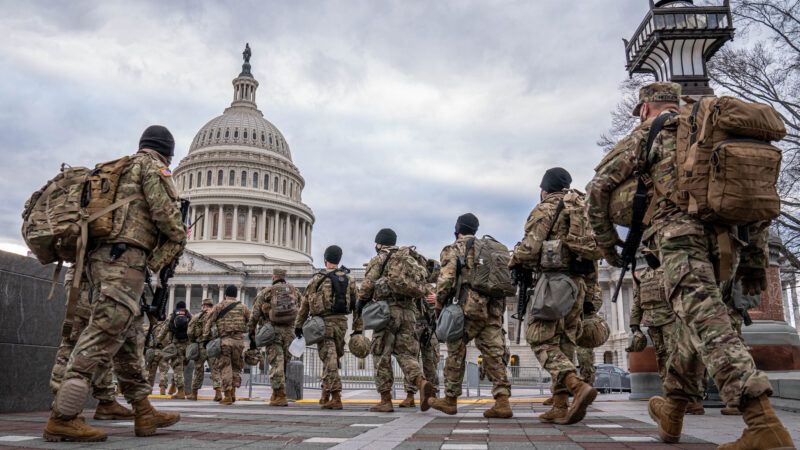Public Confidence in the Military Is Slipping
The drop in public trust has finally come for the Pentagon too.

It's no secret that public trust in institutions is in free fall. In 1958, when Americans were first asked by the National Election Study about their trust in the government, 73 percent of respondents said they could trust the government to do the right thing always or most of the time. In 2021, that number dwindled to 24 percent. The military, meanwhile, historically went unscathed—until now.
According to the Pew Research Center's latest poll, only a quarter of Americans have a great deal of confidence that the military actually acts in the public's best interest, a drop of 14 points since November 2020.
Andrew Bacevich, president of the Quincy Institute for Responsible Statecraft, cites a few explanations for this loss of confidence. "Rather than 'above' politics, the military is becoming subsumed into politics," says Bacevich. He believes that there are three main reasons for this: the military's mixed performance, its increased entanglement in partisan issues, and the politicization of everything, which means that "nothing is off limits" (not even the military).
"Trust in everything is down, and the obvious answer is that post-9/11 wars have not gone well," the Atlantic Council's Christopher Preble tells Reason. Preble also feels that the question's oversimplification doesn't fully capture the issue. He wonders whether the recent decline is in response to dishonest senior military officials or the armed forces as a whole, preferring to "drill down" into Pew's specific meaning of the military. To Preble, there is a very obvious difference between "the boots on the ground and the brass."
The Ronald Reagan Institute found, for the very first time since it began its national defense survey in 2018, that "a minority of Americans—only 45%—report having a great deal of trust and confidence in the military." Probing further, it discovered that the most common reason behind why people had low trust in the military was due to political leadership, followed by service members and scandals within the military.
Americans haven't lost all confidence in the military, but they are starting to realize that it's no longer insulated from a broader loss of trust in institutions. A majority of Americans—74 percent—still express "at least a fair amount of confidence in the military to act in the public's best interests." However, having a "fair amount" of trust in the institution that is ensuring your safety and security isn't exactly brag-worthy.
The hard truth is that not many Americans pay attention to the military until it affects them personally. But in August 2021, as the U.S. left Afghanistan in the middle of the night, Americans watched as two decades' worth of progress in the country was wiped away almost instantly.
As soon as U.S. troops entered Afghanistan in 2001, the American public was repeatedly fed lies about how the mission was going smoothly. In 2013, during a press briefing, then–Army Lt. Gen. Mark Milley praised the Afghan forces: "This army and this police force have been very, very effective in combat against the insurgents every single day. And I think that's an important story to be told across the board." No wonder the public was stunned when, eight years after Milley's comments, Afghan forces only lasted a matter of weeks when the U.S. left them to defend their country against the Taliban.
There is an inherent irony here that Preble has pointed out. "The most charitable thing that can be said is that individuals were shading the truth for a higher purpose," he wrote. "They downplayed unpleasant facts to maintain a modicum of public support." As it turns out, downplaying the truth doesn't help you gain support.
Kelley Vlahos, editorial director of Responsible Statecraft and senior adviser at the Quincy Institute, wrote of a "silver lining" in this declining trust—"Americans won't put the military on a pedestal again until it deserves it." The erosion of public confidence in the military to do what's best isn't all that shocking. Now is the time for "critical thinking, moral courage, and a merit-based system in the military," Vlahos argued.
When a group repeatedly hides the truth, glosses over issues, and misuses funds, it should be cause for concern. Other than scientists, the military remains more trusted than any other group included in Pew's survey, but it's finally facing the skepticism that it deserves.


Show Comments (41)